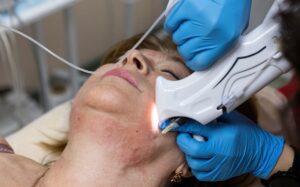IGF-1 lr3: A Substitute of IGF-1

IGF-1 lr3 is a polypeptide which also go by the name Long arginine 3 IGF-1. Researches done on it has shown that this peptide increases lipolysis to burn fat. Through this process, this peptide aids weight loss, muscle recovery. It also promotes protein synthesis in order to build muscle. This peptide has a relation to Growth Hormone.
Growth Hormone is responsible for not only growth but also for improving fat metabolism, protein production and managing key systems in the body like the nervous and cardiovascular system. GH also elevates the level of IGF-1 in the body. Natural IGF-1 or Insulin-like Growth Factor-1 is a protein which is naturally produced. With 70 amino acids, this peptide is structurally similar to Insulin. It mainly manages body and cell tissue development and growth. Right now, there are two variants of it. the first one is Synthetic IGF-1 which happens to be identical to the natural protein and capable of stimulating similar effects as natural IGF-1. The second variant IGF-1 LR3, also a synthesized version, is more potent than the natural one. The structure of IGF-1 LR3 is a bit altered than the natural protein. This makes the peptide bind poorly with the receptors. Due to this poor binding, the concentration of proteins remains increased. This results in higher potency compared to natural IGF-1.
Diabetes and fat metabolism
IGF-1 LR3 induce glucose uptake which then results in lower level of blood sugar. This decreased level of blood sugar stimulates the liver and adipose tissue to conduct breakdown or lysis of triglyceride and glycogen. This results in fat metabolism. This is how this peptide is showing potential to be effective in treating obesity as well as diabetes.
IGF-1 Deficiency
Though IGF-1 is approved to be used on patients suffering from IGF-1 deficiency, there is a lack of data on IGF-1 LR3. Research was done with RhlGF-1, a recombinant form of IGF-1. It is also called Mecasermin. It was administered on naturally short participants. The measurements before and after the process showed that there were an average of 7 cm increase in height per year. This study proves that IGF-1 analogues are capable of treating growth deficiency. As IGF-1 LR3 is also an analogue to IGF-1, it can be said that it has the potential to be a part of growth hormone deficiency treatment.
Many people have claimed that growth hormone and IGF-1 treatment have the potential to increase human life-span. IGF-1 LR3 is known to maintain the body and protect muscle cells. That is why it is a potential cellular protective and anti-aging agent. Researches on rodent models proved that this peptide is capable of preventing the advancement of several diseases like dementia and muscle atrophy. But the effects of this peptide are still a matter of discovery. Licensed researchers with the question where to buy igf 1 lr3, can buy IGF-1 LR3 for research purposes only.





